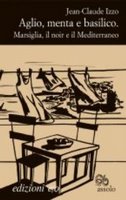Crime in Ireland, crime in the wider world, and a question
 Further to the south, I've finished Solea, final volume in Jean-Claude Izzo's Marseilles trilogy. The novel is just as romantic as its predecessors, Total Chaos and Cheops, just as besotted with the light of Marseilles and just as pained by the memory of lost love. But this novel thinks globally, too. The narrative is punctuated with U.N. and other data about the hellish intermingling of the criminal and "legitimate" economies and with harsh criticism of governments, especially France's, for failing to act.
Further to the south, I've finished Solea, final volume in Jean-Claude Izzo's Marseilles trilogy. The novel is just as romantic as its predecessors, Total Chaos and Cheops, just as besotted with the light of Marseilles and just as pained by the memory of lost love. But this novel thinks globally, too. The narrative is punctuated with U.N. and other data about the hellish intermingling of the criminal and "legitimate" economies and with harsh criticism of governments, especially France's, for failing to act.Izzo presents the information as research by a reporter whom the protagonist, Fabio Montale, is trying to find and protect. The excerpts are sprinkled throughout the novel, set it in italic type in chunks sometimes a page or two long. The presentation, set off narratively and typographically from the main action, functions like a play within a play, making its impact precisely because of its distinctive presentation.
And now, a question: That's how Jean-Claude Izzo presented blocks of factual information; how do your favorite writers do it? What thrillers make history or diplomacy come alive without making the story die? What police procedurals do a good job with forensic detail? What mysteries taught you much about an unfamiliar city or a new field of endeavor?
Or tell me about some novels that failed to do the job.
© Peter Rozovsky 2007
Technorati tags:
Declan Burke
Irish crime fiction
Jean-Claude Izzo
French crime fiction
Labels: Declan Burke, France, Ireland, Jean-Claude Izzo, Marseilles










